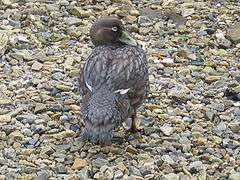Falkland steamer duck
| Falkland steamer duck | |
|---|---|
 | |
| Female | |
| Scientific classification | |
| Kingdom: | Animalia |
| Phylum: | Chordata |
| Class: | Aves |
| Order: | Anseriformes |
| Family: | Anatidae |
| Genus: | Tachyeres |
| Species: | T. brachypterus |
| Binomial name | |
| Tachyeres brachypterus (Latham, 1790) | |
The Falkland steamer duck (Tachyeres brachypterus) is a steamer duck native to the Falkland Islands in the southern Atlantic Ocean. It is one of only two bird species to be endemic to the Falkland Islands, the other being Cobb's wren.
Description
The Falkland steamer duck's wings are very short (hence the scientific name: brachy = "short", and pteron = "wing"), and it is incapable of flight. The plumage of the Falkland steamer duck is mostly dark grey, but with a white stripe behind the eye. It is very difficult to distinguish from the flying steamer duck in the field since they occupy the same habitat and, although the flying steamer duck can fly, it rarely does.
Historical description
Charles Darwin devoted two paragraphs to this bird (or the similar flying steamer duck) in The Voyage of the Beagle, having observed them at the Falkland Islands in 1833:
In these islands a great loggerheaded duck or goose (Anas brachyptera), which sometimes weighs twenty-two pounds, is very abundant. These birds were in former days called, from their extraordinary manner of paddling and splashing upon the water, race-horses; but now they are named, much more appropriately, steamers. Their wings are too small and weak to allow of flight, but by their aid, partly swimming and partly flapping the surface of the water, they move very quickly. The manner is something like that by which the common house-duck escapes when pursued by a dog; but I am nearly sure that the steamer moves its wings alternately, instead of both together, as in other birds. These clumsy, loggerheaded ducks make such a noise and splashing, that the effect is exceedingly curious.
Thus we find in South America three birds which use their wings for other purposes besides flight; the penguins as fins, the steamer as paddles, and the ostrich as sails: and the Apteryz of New Zealand, as well as its gigantic extinct prototype the Deinornis, possess only rudimentary representatives of wings. The steamer is able to dive only to a very short distance. It feeds entirely on shell-fish from the kelp and tidal rocks: hence the beak and head, for the purpose of breaking them, are surprisingly heavy and strong: the head is so strong that I have scarcely been able to fracture it with my geological hammer; and all our sportsmen soon discovered how tenacious these birds were of life. When in the evening pluming themselves in a flock, they make the same odd mixture of sounds which bull-frogs do within the tropics.
References
- ↑ BirdLife International (2012). "Tachyeres brachypterus". IUCN Red List of Threatened Species. Version 2013.2. International Union for Conservation of Nature. Retrieved 26 November 2013.
- ↑ The Voyage of the Beagle at Project Gutenberg
